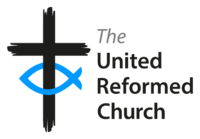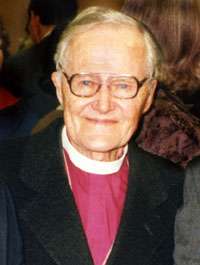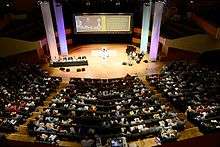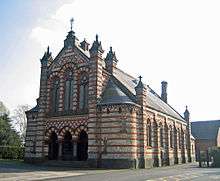United Reformed Church
| United Reformed Church | |
|---|---|
 | |
| Classification | Protestant |
| Orientation | Reformed |
| Polity |
Presbyterian Congregationalist |
| Moderator | Kevin Watson and Alan Yates |
| Associations |
World Council of Churches, World Communion of Reformed Churches, Council for World Mission, Conference of European Churches, Community of Protestant Churches in Europe, Churches Together in Britain and Ireland, Churches Together in England, Action of Churches Together in Scotland, Cytûn, Christian Aid, World Development Movement |
| Region | Great Britain |
| Origin | 1972 |
| Merger of | The URC is the result of a union between the Presbyterian Church of England and the Congregational Church in England and Wales in 1972 and subsequent unions with the Re-formed Association of Churches of Christ in 1981 and the Congregational Union of Scotland in 2000. |
| Congregations | 1,400 |
| Members | 56,000[1] |
| Official website |
www |
The United Reformed Church (URC) is a Protestant Christian church in the United Kingdom. It has approximately 56,000 members in 1,400 congregations with 608 active ministers, including 13 church related community workers.[1]
Origins and history
The United Reformed Church resulted from the 1972 union of the Presbyterian Church of England and the Congregational Church in England and Wales. In introducing the United Reformed Church Bill in the House of Commons on 21 June 1972,[2] Alexander Lyon called it "one of the most historic measures in the history of the Christian churches in this country".[3] About a quarter of English Congregational churches chose not to join the new denomination; in England, there are three main groups of continuing Congregationalists: the Congregational Federation, the Evangelical Fellowship of Congregational Churches and the Fellowship of Independent Evangelical Churches.
The URC subsequently united with the Re-formed Association of Churches of Christ in 1981[4] and the Congregational Union of Scotland in 2000.[5]
In 1982, the United Reformed Church voted in favour of a covenant with the Church of England, the Methodist Church and the Moravian Church, which would have meant remodelling its moderators as bishops and incorporating its ministry into the apostolic succession. However, the Church of England rejected the covenant.[6][7][8][9]
In 2012, the United Reformed Church voted to allow the blessing of same-sex civil partnerships.[10] In 2016, the URC voted to allow its churches to conduct same-sex marriages.[11]
Congregations and membership
According to its own records, the United Reformed Church has approximately 56,000 members in 1,400 congregations with 608 active ministers, including 13 church related community workers.[1] From 2005 to 2010, 90 congregations closed, the fourth highest number of closures for a British denomination over the period.[12]
Belief
The URC is a trinitarian church whose theological roots are distantly Reformed and whose historical and organisational roots are in the Presbyterian (Calvinism), Congregational and Churches of Christ traditions. Its Basis of Union contains a statement concerning the nature, faith and order of the United Reformed Church which sets out its beliefs in a condensed form.[13]
Polity

The URC is governed by a combined form of congregationalism and presbyterian polity.
Congregation
Each congregation (local church) within the URC is governed by a Church Meeting consisting of all its members, which is the ultimate decision-making body in the local church. There is also an elders' meeting (similar to the presbyterian Kirk Session in the Church of Scotland) which advises the Church Meeting and shares with the minister the spiritual and pastoral oversight of the church. Elders are normally elected to serve for a specific period of time.
Within the present structures, congregations are able to manage themselves and arrange their services as they choose, reflecting their circumstances and preferences. As a result, congregations, even neighbouring ones, may have quite different characters, types of service and eligibility for communion.
Congregations, through the Church Meeting, are responsible for the selection (issue of a 'call') of ministers to fill vacancies. They also select elders from within the membership and accept new members.
Synod
At a regional level, representatives of the congregations assemble in a synod. There are 11 English synods, roughly corresponding to each region of England, one in Scotland and one in Wales; each is served by a synod moderator. The synod and its committees provide oversight within the framework of presbyterian polity, giving pastoral care and making important decisions about where ministers serve and how churches share ministry. Through the synods, the URC relates to other Christian denominations at a regional level such as Anglican dioceses. Synods make many key decisions about finance, and about church property, which is usually held in trust by a synod trust company. Synods have committees and employ staff to encourage and serve local churches.
General Assembly

The URC has a General Assembly (chaired by two Moderators, one elder, one ordained a Minister of Word and Sacrament or a church related community worker) which gathers representatives of the whole of the URC to meet biennially. Advised by the Mission Council, the General Assembly plans the activity of the URC across Great Britain and makes key policy decisions about the direction of the life of the denomination. It also appoints central staff (i.e. those responsible Britain-wide), receives reports from committees, and deals with substantial reports and initiatives such as Vision4Life.[14] The synods are represented along with the convenors of the Assembly's standing committees.
There are 11 standing committees appointed by General Assembly to carry out its policy and to advise the Assembly. Each committee relates to a different area of church life, including mission, ministries and education and learning.
Mission Council, the executive body of the General Assembly, meets twice a year.
Church related community work
Church related community work (CRCW) is a distinctive ministry within the URC. CRCW ministers use the principles of community development to respond to issues facing their neighbourhoods, working alongside local individuals and organisations, developing initiatives to transform communities.
Between them, CRCW ministers enable churches to widen their mission by:
- identifying local needs and opportunities;
- confronting injustice;
- organising community action;
- developing and supporting initiatives that improve the lives and wellbeing of local people; and
- theologically reflecting upon that action.
Ecumenism
Formed in an act of ecumenical union, the URC is committed to ecumenism. The denomination is a member of many ecumenical organisations, including Churches Together in England, Cytûn (Churches Together in Wales), the Enfys covenant, Action of Churches Together in Scotland (ACTS) and Churches Together in Britain and Ireland, the World Council of Churches, the Conference of European Churches, the Community of Protestant Churches in Europe, the World Communion of Reformed Churches and the Council for World Mission.
United Reformed Church Youth
URC Youth is for young people aged 11–25. Formed in 1974, with the name the Fellowship of United Reformed Youth (FURY), it is led by URC Youth Executive who plan the annual Youth Assembly. The Youth Executive comprises a representative from each Synod, and several other members such as the Moderator and Moderator Elect. The current Moderator is Hannah Jones.
Reform magazine
The United Reformed Church has published Reform magazine since 1972, as a forum for "News, comment, inspiration debate". A digital edition of the magazine, accessed through an app or online, was launched in April 2015. Reform was called "a prophetic voice" by the theologian Robert Beckford in 2013.
Archives
The denominational archives of the United Reformed Church are held in the Congregational Library, housed at the Dr Williams's Library, in London, as are the archives of the Congregational Union of England and Wales.[15] The papers of the Presbyterian Church of England are held at Westminster College, Cambridge.[16] The papers of associated missionary societies (London Missionary Society, the Council for World Mission (Congregational), and the Foreign Missions Committee (Presbyterian)) are held by the Archives of the School of Oriental and African Studies, London.[17]
Local church records are the responsibility of the church concerned, and will normally be found either in the relevant local record office, or at the church concerned.
Churches
Eastern Region
| Church | Location | Link | Minister | Founded | Denomination |
|---|---|---|---|---|---|
| Bar Hill Church | Bar Hill, Cambridgeshire | Charles Mather | 1967 | CoE / Baptist / Methodist / URC / Quaker | |
| Basildon & Pitsea URC | Basildon, Essex | URC | |||
| Billericay URC | Billericay, Essex | Ruth Mitchell | 1672 | URC | |
| Brentwood URC | Brentwood, Essex | URC | |||
| Water Lane URC, Bishop's Stortford | Bishop's Stortford, Hertfordshire | Roy Fowler | 1662 | URC | |
| Clavering Church | Clavering, Essex | CoE / Methodist / URC | |||
| Bocking URC | Bocking, Essex | URC | |||
| Bowthorpe Church | Bowthorpe, Norfolk | Mark Elvin | 1984 | CoE / Baptist / Methodist / URC | |
| Bramerton Road Community Church | Hockley, Essex | 1926 | URC | ||
| Bridgwater Drive Church | Southend-on-Sea, Essex | Colin Baldwin | CoE / URC | ||
| Burnham-on-Crouch URC | Burnham-on-Crouch, Essex | Jon Morgan | Methodist / URC | ||
| Bury St Edmunds URC | Bury St Edmunds, Suffolk | Elaine Colechin | 1646 | URC | |
| Cambourne Church | Cambourne, Cambridgeshire | 2001 | CoE / Baptist / Methodist / URC | ||
| Castle Camps URC | Castle Camps, Cambridgeshire | URC | |||
| Castle Hill URC, Ipswich | Ipswich, Suffolk | Vacant | 1957 | URC | |
| Lion Walk URC, Colchester | Colchester, Essex | Ken Forbes | 1642 | URC | |
| Christ Church URC, Colchester | Colchester, Essex | 1843 | URC | ||
| Chappel URC | Chappel, Essex | 1901 | URC | ||
| Cheveley URC | Cheveley, Cambridgeshire | URC | |||
| Chignal Smealey URC | Chignal Smealey, Essex | URC | |||
| Christ Church URC, Clacton-on-Sea | Clacton-on-Sea, Essex | Trevor Hahn | 1885 | URC | |
| Christ Church URC, Chelmsford | Chelmsford, Essex | Vacant | URC | ||
| Christ Church URC, Southminster | Southminster, Essex | URC | |||
| Christ Church URC, Buntingford | Buntingford, Hertfordshire | Duncan Goldie | 1776 | URC | |
| Bassingbourn URC | Bassingbourn, Cambridgeshire | URC | |||
| Great Chishill & Barley | |||||
| Melbourn URC | |||||
| Christ Church, Ipswich | Ipswich, Suffolk | Vacant | 1686 | Baptist / URC | |
| Christ Church, Braintree | Braintree, Essex | Methodist / URC | |||
| Christ Church, Wickford | Wickford, Essex | Samuel Cyuma | pre-1970s | Methodist / URC | |
| Christ Church, Great Yarmouth | Great Yarmouth, Norfolk | Methodist / URC | |||
| Christ Church, Needham Market | Needham Market, Suffolk | Mary Playford | 1662 | Methodist / URC | |
| Christ Church, Newmarket | Newmarket, Suffolk | Sangwoo Seo | Methodist / URC | ||
| Church Langley Church | Church Langley, Essex | Ann Kosla | CoE / Baptist / Methodist / URC | ||
| Clare URC | Clare, Suffolk | URC | |||
| Cloverfield Community Church | Thetford, Norfolk | CoE / URC | |||
| Christ Church, Coggeshall | Coggeshall, Essex | Baptist / Methodist / URC | |||
| Kings Road URC, Southend | Southend-on-Sea, Essex | Melanie Smith, Geoff Wright | URC | ||
| Danbury Chapel URC | Danbury, Essex | 1937 | |||
| Church of Our Saviour, Chelmer | Chelmer Village, Essex | Ann Mackenzie | CoE / URC | ||
| Great Baddow URC | Great Baddow, Essex | Vacant | 1814 | ||
| Howe Green URC | Howe Green, Essex | Vacant | 1873 | ||
| Little Baddow Chapel URC | Little Baddow, Essex | 1662 | |||
| Little Waltham URC | Little Waltham, Essex | Vacant | |||
| North Avenue URC | Mark Meatcher | ||||
| Holy Trinity, South Woodham Ferrers | South Woodham Ferrers, Essex | Sue Lambert | Methodist / URC | ||
| Writtle URC | Writtle, Essex |
See also
References
- 1 2 3 2016 Yearbook (United Reformed Church, 2015), 12
- ↑ The United Reformed Church Act 1972 (a private bill) at section 2 provides that 'United Reformed Church means the church or denomination which on its formation is to be described and known as the United Reformed Church (Congregational-Presbyterian) in England and Wales, or as the United Reformed Church (Congregational-Presbyterian) or as the United Reformed Church'.
- ↑ House of Commons Hansard, 21 June 1972
- ↑ Section 2 of the United Reformed Church Act 1981 mentions 'the church thenceforth to be known as the United Reformed Church in the United Kingdom'.
- ↑ The 2008 Year Book published by the URC explains that, after the 2000 union, it is now known simply as the United Reformed Church, as defined in the United Reformed Church Act 2000. In any case, the URC no longer has any congregations in Northern Ireland, a fact acknowledged in URC (2004) A Gift Box ( ISBN 0-85346-222-4); but it does have congregations in the Channel Islands and the Isle of Man, both outside the United Kingdom.
- ↑ The Rev Caryl Micklem: Obituary in The Independent, 18 June 2003
- ↑ Thompson, David M.; Briggs, John H. Y.; Turner, John Munsey (5 February 2015). "Protestant Nonconformist Texts Volume 4: The Twentieth Century". Wipf and Stock Publishers – via Google Books.
- ↑ Tony Tucker (2003) Reformed Ministry: Traditions of Ministry and Ordination in the United Reformed Church. ISBN 978-0853462170
- ↑ Camroux, Martin (27 May 2016). "Ecumenism in Retreat: How the United Reformed Church Failed to Break the Mould". Wipf and Stock Publishers – via Google Books.
- ↑ "Ekklesia - United Reformed Church votes to host same-sex civil partnerships". www.ekklesia.co.uk. 8 July 2012.
- ↑ "United Reformed Church approves gay marriage services - BBC News". Retrieved 2016-07-10.
- ↑ https://faithsurvey.co.uk/download/csintro.pdf
- ↑ The Basis of Union. United Reformed Church website
- ↑ "Vision4Life". Vision4Life.
- ↑ Garner, Nicholas. "Dr Williams's Library - Congregational Collections". www.dwl.ac.uk.
- ↑ "Westminster College, Cambridge".
- ↑ "Archives & Special Collections, SOAS Library, SOAS, University of London". www.soas.ac.uk.
External links
| Wikimedia Commons has media related to United Reformed Church. |
Polity information
- The Basis of Union A statement concerning the nature, faith and order of the United Reformed Church
- The Structure of the United Reformed Church
- United Reformed Church Act 2000 The 1972 and 1981 Acts are not available at Her Majesty's Stationery Office website
